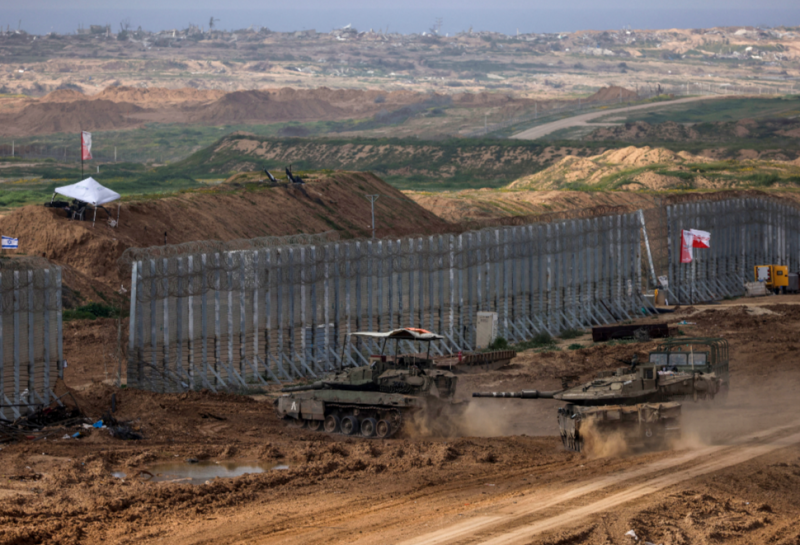
This picture taken from a position in southern Israel near the border with the Gaza Strip shows Israeli battle tanks crossing the border into northern Gaza on Feb. 19, 2024. (Credit: Ronaldo Schemidt/AFP)
UNITED NATIONS — In a significant turn of events, the United States has
proposed an alternative draft United Nations Security Council
resolution calling for a temporary cease-fire in Israel's war on Gaza and opposing a major Israeli ground offensive in Rafah in
south of the Strip, according to the text seen by Reuters on Monday.
For the last four-and-a-half months, Washington has repeatedly expressed its opposition to the use of the word cease-fire in any UN action regarding the war on Gaza, but this latest draft marks a significant shift in the United States' diplomatic stance on the military course of events in Gaza.
America is Israel's most important ally, and the text echoes language that President Joe Biden said he used last week in conversations with Israel's Prime Minister Benjamin Netanyahu.
The US draft text "determines that under current circumstances a major ground offensive into Rafah would result in further harm to civilians and their further displacement including potentially into neighboring countries."
Israel plans to storm Rafah, where more than one million of the 2.3 million Palestinians in Gaza have sought shelter, prompting international concern that such a move would sharply worsen the humanitarian crisis in Gaza.
The draft US resolution says such a move "would have serious implications for regional peace and security, and therefore underscores that such a major ground offensive should not proceed under current circumstances."
It was not immediately clear when or if the draft resolution would be put to a vote in the 15-member council. A resolution needs at least nine votes in favor and no vetoes by the United States, France, Britain, Russia or China to be adopted.
The US put forward the text after Algeria on Saturday requested the council vote on Tuesday on its draft resolution, which would demand an immediate humanitarian cease-fire in the war on Gaza. US Ambassador to the UN Linda Thomas-Greenfield quickly signaled that it would be vetoed.
Rejects buffer zone
Algeria put forward an initial draft resolution more than two weeks ago. But Thomas-Greenfield said the text could jeopardize "sensitive negotiations" around the release of hostages. Negotiations were underway in Cairo over the last week, attended alternatingly by Israeli and Hamas delegations, brokered by US, Egyptian, and Qatari officials.
Last Thursday, US Secretary of State Antony Blinken told the press he still believed a deal was "possible." But, just the day before, Netanyahu had told his delegation not to return to Cairo to continue with the week's scheduled mediations. No announcements regarding an agreement between the two parties have been made, and on Monday Israel said that if hostages weren't released by Ramadan, which starts around March 10, then its army would invade the Rafah — a plan which would surely have catastrophic outcomes and which several major countries have vocally opposed.
Washington traditionally shields its ally Israel from UN action and has twice vetoed council resolutions since Oct. 7. But it has also abstained twice, allowing the council to adopt resolutions that aimed to boost aid to Gaza and called for urgent and extended humanitarian pauses in fighting.
The draft US text would condemn calls by some Israeli government ministers for Jewish settlers to move to Gaza and would reject any attempt at demographic or territorial change in Gaza that would violate international law.
The resolution would also reject "any actions by any party that reduce the territory of Gaza, on a temporary or permanent basis, including through the establishment officially or unofficially of so-called buffer zones, as well as the widespread, systematic demolition of civilian infrastructure."
Reuters reported in December that Israel told several Arab states that it wants to carve out a buffer zone inside Gaza's borders to prevent attacks as part of proposals for the enclave after the war ends.
Satellite imagery shows that over a third of the enclave's infrastructure has been reduced to rubble. The Isreali army has assigned specific brigades to the task of demolishing buildings and bulldozing agricultural land within a kilometer of the border of Gaza, carving further into the already packed strip of land.
In December, more than three-quarters of the 193-member UN General Assembly voted to demand an immediate humanitarian cease-fire. General Assembly resolutions are not binding but carry political weight, reflecting a global view on the war.
UN Secretary-General Antonio Guterres has long called for a humanitarian ceasefire in Gaza. UN aid chief Martin Griffith warned last week that military operations in Rafah "could lead to a slaughter."
proposed an alternative draft United Nations Security Council
resolution calling for a temporary cease-fire in Israel's war on Gaza and opposing a major Israeli ground offensive in Rafah in
south of the Strip, according to the text seen by Reuters on Monday.
For the last four-and-a-half...